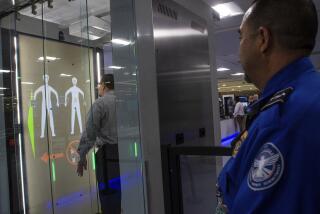Airport’s free wireless service comes at a price
The latest hullabaloo at Denver International Airport, the $4-billion transit hub that became notorious for malfunctioning baggage-handling when it opened in 1995, has all the makings of a classic Internet scandal.
Sex? Check. Hip, tech-savvy blogs? Check. David Byrne, founder of the Talking Heads? Check.
It all started in November, when the airport announced it would provide free wireless Internet access.
The local media and Web mavens praised Denver International for being one of few airports in the country to allow travelers to access the Internet gratis. Users soared from a few hundred a day to up to 10,000. (Those connecting for free still have to log in, so that DIA officials know how much traffic the service is getting.)
Then in February, Byrne came to town. The musician, who was here on a layover, tried to visit the popular hipster technology blog Boing Boing. The site was blocked by the airport’s Internet administrator for falling into the category of “Incidental Nudity, Blogs/Wiki.”
Byrne commended the airport for its free wireless but wrote about the incident on his blog.
Boing Boing, by many measures the most-read blog on the Internet, linked to Byrne’s post. The local alternative weekly spotted it and blogged about the mushrooming controversy. (“The conspiracy theorists must be right: Denver International Airport is a gate to Hell,” wrote Joel Warner in Westword. “After all, what other than some diabolical force would deign to upset nerd-tastic musician David Byrne (he of the Talking Heads) as he tried to access his favorite websites while passing time in our fair airport?”)
The Denver Post put the story on the front page and quoted Byrne saying: “Give people some credit. And the more credit you give them, the more they respond. It’s just trusting people’s discretion.”
Airport officials say they put the filtering software in because they knew the free WiFi would mean more people surfing the Web between flights. “We have a lot of families coming through DIA, and we don’t think it’s appropriate for anyone, especially families, to be subjected to offensive materials,” airport spokesman Jeff Green said.
He stressed that the software, from the company Secure Computing, determines what is offensive, not the airport administration.
And the airport will allow a site that was unnecessarily blocked to be accessed if it receives complaints, Green said. So far it has received two, not counting Byrne.
“We would rather address concerns from individuals who are trying to get on sites that are blocked than deal with complaints from families whose children inadvertently were exposed to offensive materials,” Green said.
Xeni Jardin, co-editor of Boing Boing, scoffed at that argument. “It’s a clumsy, ill-engineered, blunt approach,” she said. “It creates a poorer-quality experience for the user. Great, it’s free, but at what cost?”
Jardin and others at Boing Boing have been on a crusade against Web-filtering software, which she noted is used by repressive governments such as Saudi Arabia and Sudan. She said Boing Boing evidently became classified as offensive by some filters because it once showed an image of the cover of a design book that replicated the cover of a risque men’s magazine.
Also, Jardin questioned the likelihood of someone actually looking at pornography in a public place like an airport.
“There’s a social decorum that would tend to pressure people against that,” she said. “Especially in an airport, especially nowadays.”
nicholas.riccardi @latimes.com
More to Read
Sign up for The Wild
We’ll help you find the best places to hike, bike and run, as well as the perfect silent spots for meditation and yoga.
You may occasionally receive promotional content from the Los Angeles Times.






